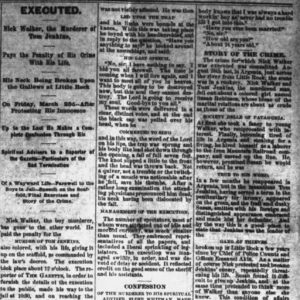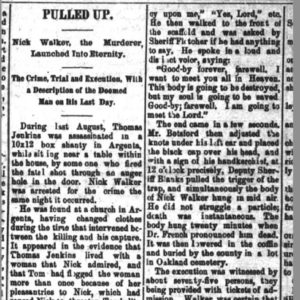calsfoundation@cals.org
Nick Walker (Execution of)
Nick Walker was a young African American man who was hanged in Little Rock (Pulaski County) on March 23, 1883, for the murder of a romantic rival the year before.
Nick Walker was born into slavery near Dallas, Texas, around 1859. He said he never knew either of his parents but at some point moved to a place near Camden (Ouachita County) where an aunt lived, staying there until 1878. He eventually moved to Little Rock and worked for the Iron Mountain Railroad. He became enamored of a prostitute named Susan Robinson in Argenta (now North Little Rock in Pulaski County), whom he knew from Ouachita County.
Robinson was also involved with a man named Tom Jenkins (sometimes referred to as Jennings and in one case as Dennis Serrill), an ex-convict who lived in a “10 x 12 box shanty” behind Atkins’s Saloon in Argenta. Jenkins would beat Robinson, sometimes severely, after she met with Walker, and Walker was heard to threaten to kill Jenkins on several occasions.
On August 28, 1882, while Jenkins was eating dinner in his shanty, someone stuck the barrel of a pistol through an auger hole in the door and fired. A newspaper reported that “the ball took effect in the back of the head and produced almost instant death,” though another report stated that Jenkins lived until September 7. Walker was identified as a suspect—one constable would testify that the dying man told him “Nick Walker shot me”—and jailed shortly after the shooting. A coroner’s inquest charged Walker with murder based on circumstantial evidence, though Walker continued to profess his innocence.
An initial trial resulted in a hung jury, but Walker was convicted of first-degree murder on November 3, 1882, and sentenced to be executed on December 21, 1882. That sentence was delayed while he appealed to the Arkansas Supreme Court, which on January 20, 1883, declined to overturn the jury’s verdict.
Governor James H. Berry set a March 9, 1883, date for Walker to hang but later granted a two-week respite. On the day before his execution, Walker met with his spiritual advisers and admitted that he had murdered Jenkins.
On March 23, 1883, Walker said goodbye and shook hands with his fellow inmates in the Pulaski County jail, including murder suspect Deno Casat (who would later be executed). He ascended the gallows before a crowd of around seventy-five ticketed observers, accompanied by his counseling preachers, who prayed for him, sang hymns, and read passages from the Psalms.
Addressing the crowd, Walker said that “this body is going to be destroyed now, but this soul they cannot destroy. The Lord is going to receive my soul.” He sang a hymn as the black cap was placed over his head and the noose around his neck, and the Arkansas Gazette reported “in this way, the word of the Lord on his lips, the trap was sprung and his body like lead shot down through the opening, a fall of full seven feet.” An Arkansas Democrat reporter wrote that the trap door opened at noon, and “he did not struggle a particle; death was instantaneous.”
Walker is buried in Oakland-Fraternal Cemetery in Little Rock.
For additional information:
“Additional Local.” Arkansas Democrat, September 8, 1882, p. 1.
“Among the Roughs.” Arkansas Gazette, November 26, 1882, p. 5.
“Circuit Court Yesterday.” Arkansas Gazette, October 13, 1882, p. 5.
“Dead.” Arkansas Democrat, September 7, 1882, p. 1.
“Doomed.” Arkansas Democrat, March 6, 1883, p. 4.
“Executed.” Arkansas Gazette, March 24, 1883, p. 1.
“Final Day.” Arkansas Gazette, March 23, 1883, p. 4.
“Local Brevities.” Arkansas Democrat, January 20, 1883, p. 1.
“Local Paragraphs.” Arkansas Gazette, October 12, 1882, p. 8.
“Pulled Up.” Arkansas Democrat, March 23, 1883, p. 1.
“Supreme Court Decisions.” Arkansas Democrat, February 16, 1883, p. 3.
“To Be Hung.” Arkansas Gazette, November 4, 1882, p. 4.
Mark K. Christ
Central Arkansas Library System
 Law
Law Post-Reconstruction through the Gilded Age, 1875 through 1900
Post-Reconstruction through the Gilded Age, 1875 through 1900 Nick Walker Execution Story
Nick Walker Execution Story  Nick Walker Execution Story
Nick Walker Execution Story 




Comments
No comments on this entry yet.